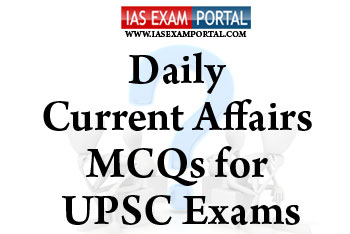Current Affairs MCQ for UPSC Exams - 12 August 2019

Current Affairs MCQ for UPSC Exams - 12 August 2019
Q1. Consider the following statements :
1) India is the world’s second largest cultivator of bamboo after China, with
136 species and 23 general spread over 13.96 million hectares.
2) Even though Indian bamboo production is lesser than that of China’s, the
yield per hectare value is higher for India.
3) The bamboo is used in different types of products and it is a very good
earning option for the tribals, for which necessary seed money, facilities and
expertise need to be provided to tribal artisans.
Which of the above statements are true ?
a) 1 & 2 only
b) 2 & 3 only
c) 1 & 3 only
d) all of the above
Q2. Consider the following pairs of rock cut architectures in India and their respective locations :
1) Kanhericaves : Mumbai
2) Pitalkhora : Guwahati
3) Pandavlenicaves :Nashik
4) Varaha cave temple :Kancheepuram
5) Baghcaves :Mysuru
Which of the above pairs are true ?
a) 1 ,2& 3 only
b) 3,4 & 5 only
c) 1,3 & 4 only
d) all of the above
Q3. India and United Kingdom launched two-year joint initiative- Innovating for Clean Air (IfCA) in Bengaluru recently.Which of the following statements regarding the same stands true ?
1) The initiative provides a unique measurement system for air quality by
integrating satellite and sensor data and helping to support India's transition
to electric vehicles.
2) It will identify relevant challenges around EV-charging infrastructure,
integrating renewable energy and grid management to ensure sufficient, reliable
and clean source of power.
3) It will also facilitate opportunities for Indian and UK innovators to
collaborate in developing long-lasting relationships to address these
challenges.
a) 1 & 2 only
b) 2 & 3 only
c) 1 & 3 only
d) all of the above
Q4. The Centre now hopes to mandate uniform certification by pushing through a replacement to the Seeds Act, 1966.Which of the following statements regarding the same stands true ?
1) Seed certification is a process designed to maintain and make available to
the general public continuous supply of high quality seeds and propagating
materials of notified kinds and varieties of crops, so grown and distributed to
ensure the physical identity and genetic purity.
2) A legal status was given to seed certification with the enactment of first
Indian Seed Act in the year 1966 and formulation of Seed Rules in 1968. The Seed
Act of 1966 provided the required impetus for the establishment of official Seed
Certification Agencies by the Local Panchayat bodies.
3) The validity period of certificate shall be nine months from the date of test
at the time of initial certification while a seed lot will be eligible for
extension of the validity period as long as it conforms to the prescribed
standards.
a) 1 & 2 only
b) 2 & 3 only
c) 1 & 3 only
d) all of the above
Q5. Which of the following states ranked first in the recently released report on “Breastfeeding & Infant and child feeding practices” in India by the central government?
a) Kerala
b) Assam
c) Manipur
d) Bihar

